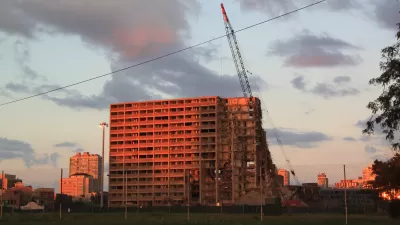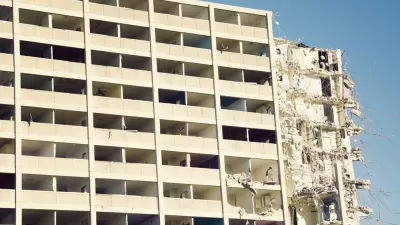With the demolition of notorious high-rise housing projects such as Cabrini-Green over the last decade and a half, Chicago became a model for a new approach to public housing. A new study tracks former high-rise residents to see how they've fared.
As the Chicago Housing Authority (CHA) prepares to release a revised version of its 12-year-old Plan for Transformation - "the largest, most ambitious redevelopment effort of public housing in the United States" - a new study by the Urban Institute of 381 families that once lived in the Madden-Wells and Dearborn housing complexes seeks to examine just how successful that influential plan has been.
According to , "Public housing residents in Chicago are marginally better off today than when they lived in the high-rise towers that have since been torn down, though more social services are needed to prevent a backslide, a study scheduled to be released Monday finds."
"Continuing problems with poverty and crime in their new neighborhoods point to a potentially dark future for many of those nearly 16,000 families, particularly children, the report by the Washington-based Urban Institute says."
What the study seems to make clear is that more than a change of scenery is required to improve people's lives.
"You still have a lot of people with very severe health problems, low levels of employment, lots of criminal justice involvement, all the kinds of things that they had before," Susan Popkin, the lead researcher in the study said. "Where we saw the improvements in terms of people's mental health, physical health and employment was when the housing was coupled with very intensive supportive services for a subset of residents."
Another obstacle: despite the goal of the CHA to move public housing families into "areas of opportunity" that are socially and economically diverse, "just seven of the 381 families tracked by researchers live in areas which fit that category."
FULL STORY: Study: CHA residents marginally better off than when living in high-rises

Planetizen Federal Action Tracker
A weekly monitor of how Trump’s orders and actions are impacting planners and planning in America.

Maui's Vacation Rental Debate Turns Ugly
Verbal attacks, misinformation campaigns and fistfights plague a high-stakes debate to convert thousands of vacation rentals into long-term housing.

Restaurant Patios Were a Pandemic Win — Why Were They so Hard to Keep?
Social distancing requirements and changes in travel patterns prompted cities to pilot new uses for street and sidewalk space. Then it got complicated.

In California Battle of Housing vs. Environment, Housing Just Won
A new state law significantly limits the power of CEQA, an environmental review law that served as a powerful tool for blocking new development.

Boulder Eliminates Parking Minimums Citywide
Officials estimate the cost of building a single underground parking space at up to $100,000.

Orange County, Florida Adopts Largest US “Sprawl Repair” Code
The ‘Orange Code’ seeks to rectify decades of sprawl-inducing, car-oriented development.
Urban Design for Planners 1: Software Tools
This six-course series explores essential urban design concepts using open source software and equips planners with the tools they need to participate fully in the urban design process.
Planning for Universal Design
Learn the tools for implementing Universal Design in planning regulations.
Heyer Gruel & Associates PA
JM Goldson LLC
Custer County Colorado
City of Camden Redevelopment Agency
City of Astoria
Transportation Research & Education Center (TREC) at Portland State University
Jefferson Parish Government
Camden Redevelopment Agency
City of Claremont




























